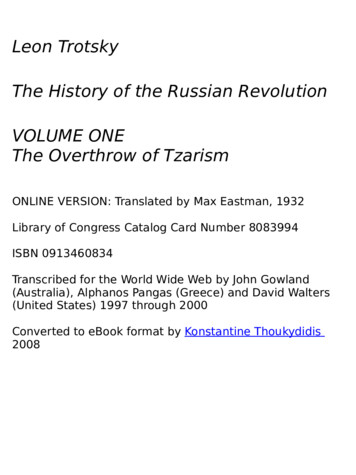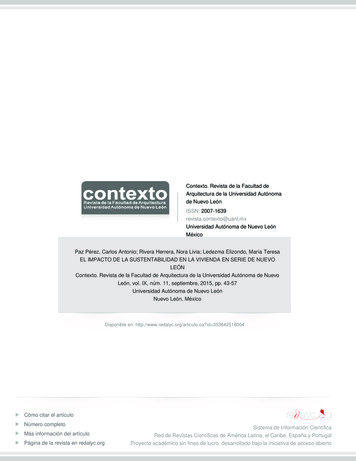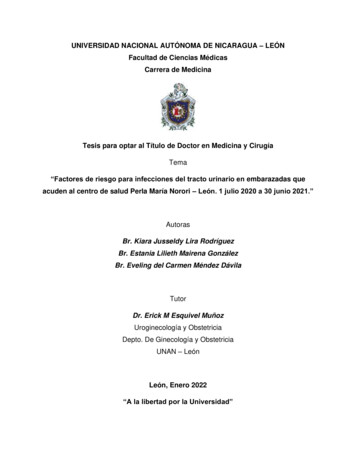
Transcription
Leon TrotskyThe History of the Russian RevolutionVOLUME ONEThe Overthrow of TzarismONLINE VERSION: Translated by Max Eastman, 1932Library of Congress Catalog Card Number 8083994ISBN 0913460834Transcribed for the World Wide Web by John Gowland(Australia), Alphanos Pangas (Greece) and David Walters(United States) 1997 through 2000Converted to eBook format by Konstantine Thoukydidis2008
Table of ContentsPreface.4Chapter 1: Peculiarities of Russia’s Development.12Chapter 2: Tzarist Russia in the War.29Chapter 3: The proletariat and the Peasantry.51Chapter 4: The Tzar and the Tzarina.76Chapter 5: The Idea of a Palace Revolution.92Chapter 6: The Death Agony of the Monarchy.110Chapter 7: Five Days (February 23-27, 1917).140Chapter 8: Who Led the February Insurrection?.185Chapter 9: The Paradox of the February Revolution.207Chapter 10: The New Power.241Chapter 11: Dual Power.274Chapter 12: The Executive Committee.287Chapter 13: The Army and the War.328Chapter 14: The Ruling Group and the War.356Chapter 15: The Bolsheviks and Lenin.375Chapter 16: Rearming the Party.410Chapter 17: The “April Days”.433Chapter 18: The First Coalition.467Chapter 19: The Offensive.486Chapter 20: The Peasantry.508Chapter 21: Shifts in the Masses.533Chapter 22: The Soviet Congress and the JuneDemonstration.569Chapter 23: Conclusion.595Chronological Table for Volume One.600Appendix I(To the Chapter Peculiarities of Russia’s Development).609Appendix II
(To the Chapter Re-arming the Party).621Appendix III(To the Chapter The Soviet Congress and the JuneDemonstration).632
PrefaceDuring the first two months of 1917 Russia was still aRomanov monarchy. Eight months later the Bolsheviksstood at the helm. They were little know to anybody whenthe year began, and their leaders were still underindictment for state treason when they came to power. Youwill not find another such sharp turn in history – especiallyif you remember that it involves a nation of 150 millionpeople. It is clear that the events of 1917, whatever youthink of them, deserve study.The history of a revolution, like every other history, oughtfirst of all to tell what happened and how. That, however,is little enough. From the very telling it ought to becomeclear why it happened thus and not otherwise. Events canneither be regarded as a series of adventures, nor strungon the thread of a preconceived moral. They must obeytheir own laws. The discovery of these laws is the author’stask.The most indubitable feature of a revolution is the directinterference of the masses in historical events. In ordinarytimes the state, be it monarchical or democratic, elevatesitself above the nation, and history is made by specialistsin that line of business - kings, ministers, bureaucrats,parliamentarians, journalists. But at those crucial momentswhen the old order becomes no longer endurable to themasses, they break over the barriers excluding them fromthe political arena, sweep aside their traditionalrepresentatives, and create by their own interference the
initial groundwork for a new régime. Whether this is goodor bad we leave to the judgement of moralists. Weourselves will take the facts as they are given by theobjective course of development. The history of arevolution is for us first of all a history of the forcibleentrance of the masses into the realm of rulership overtheir own destiny.In a society that is seized by revolution classes are inconflict. It is perfectly clear, however, that the changesintroduced between the beginning and the end of arevolution in the economic bases of the society and itssocial substratum of classes, are not sufficient to explainthe course of the revolution itself, which can overthrow ina short interval age-old institutions, create new ones, andagain overthrow them. The dynamic of revolutionaryevents is directly determined by swift, intense andpassionate changes in the psychology of classes whichhave already formed themselves before the revolution.The point is that society does not change its institutions asneed arises, the way a mechanic changes his instruments.On the contrary, society actually takes the institutionswhich hang upon it as given once for all. For decades theoppositional criticism is nothing more than a safety valvefor mass dissatisfaction, a condition of the stability of thesocial structure. Such in principle, for example, was thesignificance acquired by the social-democratic criticism.Entirely exceptional conditions, independent of the will ofpersons and parties, are necessary in order to tear off fromdiscontent the fetters of conservatism, and bring themasses to insurrection.The swift changes of mass views and moods in an epoch of
revolution thus derive, not from the flexibility and mobilityof man’s mind, but just the opposite, from its deepconservatism. The chronic lag of ideas and relationsbehind new objective conditions, right up to the momentwhen the latter crash over people in the form of acatastrophe, is what creates in a period of revolution thatleaping movement of ideas and passions which seems tothe police mind a mere result of the activities of“demagogues.”The masses go into a revolution not with a prepared planof social reconstruction, but with a sharp feeling that theycannot endure the old régime. Only the guiding layers of aclass have a political program, and even this still requiresthe test of events, and the approval of the masses. Thefundamental political process of the revolution thusconsists in the gradual comprehension by a class of theproblems arising from the social crisis – the activeorientation of the masses by a method of successiveapproximations. The different stages of a revolutionaryprocess, certified by a change of parties in which the moreextreme always supersedes the less, express the growingpressure to the left of the masses – so long as the swing ofthe movement does not run into objective obstacles. Whenit does, there begins a reaction: disappointments of thedifferent layers of the revolutionary class, growth ofindifferentism, and therewith a strengthening of theposition of the counter-revolutionary forces. Such, at least,is the general outline of the old revolutions.Only on the basis of a study of political processes in themasses themselves, can we understand the rôle of partiesand leaders, whom we least of all are inclined to ignore.They constitute not an independent, but nevertheless a
very important, element in the process. Without a guidingorganisation, the energy of the masses would dissipate likesteam not enclosed in a piston-box. But nevertheless whatmoves things is not the piston or the box, but the steam.The difficulties which stand in the way of studying thechanges of mass consciousness in a revolutionary epochare quite obvious. The oppressed classes make history inthe factories, in the barracks, in the villages, on the streetsof the cities. Moreover, they are least of all accustomed towrite things down. Periods of high tension in socialpassions leave little room for contemplation and reflection.All the muses – even the plebeian muse of journalism, inspite of her sturdy hips – have hard sledding in times ofrevolution. Still the historian’s situation is by no meanshopeless. The records are incomplete, scattered,accidental. But in the light of the events themselves thesefragments often permit a guess as to the direction andrhythm of the hidden process. For better or worse, arevolutionary party bases its tactics upon a calculation ofthe changes of mass consciousness. The historic course ofBolshevism demonstrates that such a calculation, at leastin its rough features, can be made. If it can be made by arevolutionary leader in the whirlpool of the struggle, whynot by the historian afterwards?However, the processes taking place in the consciousnessof the masses are not unrelated and independent. Nomatter how the idealists and the eclectics rage,consciousness is nevertheless determined by conditions. Inthe historic conditions which formed Russia, her economy,her classes, her State, in the action upon her of otherstates, we ought to be able to find the premises both ofthe February revolution and of the October revolution
which replaced it. Since the greatest enigma is the factthat a backward country was the first to place theproletariat in power, it behoves us to seek the solution ofthat enigma in the peculiarities of that backward country –that is, in its differences from other countries.The historic peculiarities of Russia and their relative weightwill be characterised by us in the early chapters of thisbook which give a short outline of the development ofRussian society and its inner forces. We venture to hopethat the inevitable schematism of these chapters will notrepel the reader. In the further development of the book hewill meet these same forces in living action.This work will not rely in any degree upon personalrecollections. The circumstance that the author was aparticipant in the events does not free him from theobligation to base his exposition upon historically verifieddocuments. The author speaks of himself, in so far as thatis demanded by the course of events, in the third person.And that is not a mere literary form: the subjective tone,inevitable in autobiographies or memoirs, is notpermissible in a work of history.However, the fact that the author did participate in thestruggle naturally makes easier his understanding, notonly of the psychology of the forces in action, bothindividual and collective, but also of the inner connectionof events. This advantage will give positive results only ifone condition is observed: that he does not rely upon thetestimony of his own memory either in trivial details or inimportant matters, either in questions of fact or questionsof motive and mood. The author believes that in so far asin him lies he has fulfilled this condition.
There remains the question of the political position of theauthor, who stands as a historian upon the same viewpointupon which he stood as a participant in the events. Thereader, of course, is not obliged to share the political viewsof the author, which the latter on his side has no reason toconceal. But the reader does have the right to demandthat a historical work should not be the defence of apolitical position, but an internally well-founded portrayalof the actual process of the revolution. A historical workonly then completely fulfils the mission when eventsunfold upon its pages in their full natural necessity.For this, is it necessary to have the so-called historian’s“impartiality”? Nobody has yet clearly explained what thisimpartiality consists of. The often quoted words ofClemenceau that it is necessary to take a revolution “enbloc,” as a whole – are at the best a clever evasion. Howcan you take as a whole a thing whose essence consists ina split? Clemenceau’s aphorism was dictated partly byshame for his too resolute ancestors, partly byembarrassment before their shades.One of the reactionary and therefore fashionable historiansin contemporary France, L. Madelin, slandering in hisdrawing-room fashion the great revolution – that is, thebirth of his own nation – asserts that “the historian oughtto stand upon the wall of a threatened city, and behold atthe same time the besiegers and the besieged”: only inthis way, it seems, can he achieve a “conciliatory justice.”However, the words of Madelin himself testify that if heclimbs out on the wall dividing the two camps, it is only inthe character of a reconnoiterer for the reaction. It is wellthat he is concerned only with war camps of the past: in atime of revolution standing on the wall involves great
danger. Moreover, in times of alarm the priests of“conciliatory justice” are usually found sitting on the insideof four walls waiting to see which side will win.The serious and critical reader will not want a treacherousimpartiality, which offers him a cup of conciliation with awell-settled poison of reactionary hate at the bottom, but ascientific conscientiousness, which for its sympathies andantipathies – open and undisguised – seeks support in anhonest study of the facts, a determination of their realconnections, an exposure of the causal laws of theirmovement. That is the only possible historic objectivism,and moreover it is amply sufficient, for it is verified andattested not by the good intentions of the historian, forwhich only he himself can vouch, but the natural lawsrevealed by him of the historic process itself.The sources of this book are innumerable periodicalpublications, newspapers and journals, memoirs, reports,and other material, partly in manuscript, but the greaterpart published by the Institute of the History of theRevolution in Moscow and Leningrad. We have consideredits superfluous to make reference in the text to particularpublications, since that would only bother the reader.Among the books which have the character of collectivehistorical works we have particularly used the two-volumeEssays on the History of the October Revolution(Moscow-Leningrad, 1927). Written by different authors,the various parts of this book are unequal in value, butthey contain at any rate abundant factual material.The dates in our book are everywhere indicated accordingto the old style – that is, they are 13 days behind theinternational and the present Soviet calendar. The author
felt obliged to use the calendar which was in use at thetime of the revolution. It would have been no labour ofcourse to translate the dates into the new style. But thisoperation in removing one difficulty would have createdothers more essential. The overthrow of the monarchy hasgone into history as the February revolution; according tothe Western calendar, however, it occurred in March. Thearmed demonstration against the imperialist policy of theProvisional Government has gone into history under thename of the “April Days,” whereas according to theWestern calendar it happened in May. Not to mention otherintervening events and dates, we remark only that theOctober revolution happened according to Europeanreckoning in November. The calendar itself, we see, istinted by the events, and the historian cannot handlerevolutionary chronology by mere arithmetic. The readerwill be kind enough to remember that before overthrowingthe Byzantine calendar, the revolution had to overthrowthe institutions that clung to it.L. TROTSKYPrinkipoNovember 14, 1930
Chapter 1: Peculiarities of Russia’sDevelopmentThe fundamental and most stable feature of Russianhistory is the slow tempo of her development, with theeconomic backwardness, primitiveness of social forms andlow level of culture resulting from it.The population of this gigantic and austere plain, open toeastern winds and Asiatic migrations, was condemned bynature itself to a long backwardness. The struggle withnomads lasted almost up to the end of the seventeenthcentury; the struggle with winds, bringing winter cold andsummer drought, continues still. Agriculture, the basis ofthe whole development, advanced by extensive methods.In the north they cut down and burned up the forests, inthe south they ravished the virgin steppes. The conquestof nature went wide and not deep.While the western barbarians settled in the ruins of Romanculture, where many an old stone lay ready as buildingmaterial, the Slavs in the East found no inheritance upontheir desolate plain: their predecessors had been on evena lower level of culture than they. The western Europeanpeoples, soon finding their natural boundaries, createdthose economic and cultural clusters, the commercialcities. The population of the eastern plain, at the first signof crowding, would go deeper into the forest or spread outover the steppe. The more aggressive and enterprisingelements of the peasantry in the west became burghers,
craftsmen, merchants. The more active and bold in theeast became, some of them, traders, but most of themCossacks, frontiersmen, pioneers. The process of socialdifferentiation, intensive in the west, was delayed in theeast and diluted by the process of expansion. “The Tzar ofMuscovia, although a Christian, rules a lazy-mindedpeople,” wrote Vico, a contemporary of Peter I. That “lazy”mind of the Muscovites was a reflection of the slow tempoof economic development, the formlessness of classrelations, the meagerness of inner history.The ancient civilisations of Egypt, India and China had acharacter self-sufficient enough, and they had timeenough at their disposal, to bring their social relations, inspite of low productive powers, almost to the samedetailed completion to which their craftsmen brought theproducts of their craft. Russia stood not onlygeographically, but also socially and historically, betweenEurope and Asia. She was marked off from the EuropeanWest, but also from the Asiatic East, approaching atdifferent periods and in different features now one, nowthe other. The East gave her the Tartar yoke, whichentered as an important element into the structure of theRussian state. The West was a still more threatening foe –but at the same time a teacher. Russia was unable tosettle in the forms of the East because she was continuallyhaving to adapt herself to military and economic pressurefrom the West. The existence of feudal relations in Russia,denied by former historians, may be consideredunconditionally established by later investigations.Furthermore, the fundamental elements of Russianfeudalism were the same as in the West. But the mere factthat the existence of the feudal epoch had to be
established by means of extended scientific argumentssufficiently testifies to the incompleteness of Russianfeudalism, its formlessness, its poverty of culturalmonuments.A backward country assimilates the material andintellectual conquests of the advanced countries. But thisdoes not mean that it follows them slavishly, reproducesall the stages of their past. The theory of the repetition ofhistoric cycles – Vico and his more recent followers – restsupon an observation of the orbits of old pre-capitalistcultures, and in part upon the first experiments ofcapitalist development. A certain repetition of culturalstages in ever new settlements was in fact bound up withthe provincial and episodic character of that wholeprocess. Capitalism means, however, an overcoming ofthose conditions. It prepares and in a certain senserealises the universality and permanence of man’sdevelopment. By this a repetition of the forms ofdevelopment by different nations is ruled out. Althoughcompelled to follow after the advanced countries, abackward country does not take things in the same order.The privilege of historic backwardness – and such aprivilege exists – permits, or rather compels, the adoptionof whatever is ready in advance of any specified date,skipping a whole series of intermediate stages. Savagesthrow away their bows and arrows for rifles all at once,without travelling the road which lay between those twoweapons in the past. The European colonists in Americadid not begin history all over again from the beginning.The fact that Germany and the United States have noweconomically outstripped England was made possible bythe very backwardness of their capitalist development. On
the other hand, the conservative anarchy in the Britishcoal industry – as also in the heads of MacDonald and hisfriends – is a paying-up for the past when England playedtoo long the rôle of capitalist pathfinder. The developmentof historically backward nations leads necessarily to apeculiar combination of different stages in the historicprocess. Their development as a whole acquires aplanless, complex, combined character.The possibility of skipping over intermediate steps is ofcourse by no means absolute. Its degree is determined inthe long run by the economic and cultural capacities of thecountry. The backward nation, moreover, not infrequentlydebases the achievements borrowed from outside in theprocess of adapting them to its own more primitiveculture. In this the very process of assimilation acquires aself-contradictory character. Thus the introduction ofcertain elements of Western technique and training, aboveall military and industrial, under Peter I, led to astrengthening of serfdom as the fundamental form oflabour organisation. European armament and Europeanloans – both indubitable products of a higher culture – ledto a strengthening of tzarism, which delayed in its turn thedevelopment of the country.The laws of history have nothing in common with apedantic schematism. Unevenness, the most general lawof the historic process, reveals itself most sharply andcomplexly in the destiny of the backward countries. Underthe whip of external necessity their backward culture iscompelled to make leaps. From the universal law ofunevenness thus derives another law which, for the lack ofa better name, we may call the law of combineddevelopment – by which we mean a drawing together of
the different stages of the journey, a combining of theseparate steps, an amalgam of archaic with morecontemporary forms. Without this law, to be taken ofcourse, in its whole material content, it is impossible tounderstand the history of Russia, and indeed of anycountry of the second, third or tenth cultural class.Under pressure from richer Europe the Russian Stateswallowed up a far greater relative part of the people’swealth than in the West, and thereby not only condemnedthe people to a twofold poverty, but also weakened thefoundations of the possessing classes. Being at the sametime in need of support from the latter, it forced andregimented their growth. As a result the bureaucratisedprivileged classes never rose to their full height, and theRussian state thus still more approached an Asiaticdespotism. The Byzantine autocratism, officially adoptedby the Muscovite tzars at the beginning of the sixteenthcentury, subdued the feudal Boyars with the help of thenobility, and then gained the subjection of the nobility bymaking the peasantry their slaves, and upon thisfoundation created the St. Petersburg imperial absolutism.The backwardness of the whole process is sufficientlyindicated in the fact that serfdom, born at the end of thesixteenth century, took form in the seventeenth, floweredin the eighteenth, was juridically annulled only in 1861.The clergy, following after the nobility, played no smallrôle in the formation of the tzarist autocracy, butnevertheless a servile rôle. The church never rose inRussia to that commanding height which it attained in theCatholic West; it was satisfied with the rôle of spiritualservant of the autocracy, and counted this a recompensefor its humility. The bishops and metropolitans enjoyed
authority merely as deputies of the temporal power. Thepatriarchs were changed along with the tzars. In thePetersburg period the dependence of the church upon thestate became still more servile. Two hundred thousandpriests and monks were in all essentials a part of thebureaucracy, a sort of police of the gospel. In return forthis the monopoly of the orthodox clergy in matters offaith, land and income was defended by a more regularkind of police.Slavophilism, the messianism of backwardness, has basedits philosophy upon the assumption that the Russianpeople and their church are democratic through andthrough, whereas official Russia is a German bureaucracyimposed upon them by Peter the Great. Mark remarkedupon this theme: “In the same way the Teutonic jackassesblamed the despotism of Frederick the Second upon theFrench, as though backward slaves were not always inneed of civilised slaves to train them.” This brief commentcompletely finishes off not only the old philosophy of theSlavophiles, but also the latest revelations of the “Racists.”The meagerness not only of Russian feudalism, but of allthe old Russian history, finds its most depressingexpression in the absence of real mediaeval cities ascentres of commerce and craft. Handicraft did not succeedin Russia in separating itself from agriculture, butpreserved its character of home industry. The old Russiancities were commercial, administrative, military andmanorial – centres of consumption, consequently, not ofproduction. Even, Novgorod, similar to Hansa and notsubdued by the Tartars, was only a commercial, and not anindustrial city. True, the distribution of the peasantindustries over various districts created a demand for
trade mediation on a large scale. But nomad traders couldnot possibly occupy that place in social life which belongedin the West to the craft-guild and merchant-industrial pettyand middle bourgeoisie, inseparably bound up with itspeasant environment. The chief roads of Russian trade,moreover, led across the border, thus from timeimmemorial giving the leadership to foreign commercialcapital, and imparting a semi-colonial character to thewhole process, in which the Russian trader was a mediatorbetween the Western cities and the Russian villages. Thiskind of economic relation developed further during theepoch of Russian capitalism and found its extremeexpression in the imperialist war.The insignificance of the Russian cities, which more thananything else promoted the development of an Asiaticstate, also made impossible a Reformation – that is, areplacement of the feudal-bureaucratic orthodoxy by somesort of modernised kind of Christianity adapted to thedemands of a bourgeois society. The struggle against thestate church did not go farther than the creation ofpeasant sects, the faction of the Old Believers being themost powerful among them.Fifteen years before the great French revolution theredeveloped in Russia a movement of the Cossacks,peasants and worker-serfs of the Urals, known as thePugachev Rebellion. What was lacking to this menacingpopular uprising in order to convert it into a revolution? AThird Estate. Without the industrial democracy of the citiesa peasant war could not develop into a revolution, just asthe peasant sects could not rise to the height of aReformation. The result of the Pugachev Rebellion was justthe opposite – a strengthening of bureaucratic absolutism
as the guardian of the interests of the nobility, a guardianwhich had again justified itself in the hour of danger.The Europeanization of the country, formally begun in thetime of Peter, became during the following century moreand more a demand of the ruling class itself, the nobility.In 1825 the aristocratic intelligentsia, generalising thisdemand politically, went to the point of a militaryconspiracy to limit the powers of the autocracy. Thus,under pressure from the European bourgeois development,the progressive nobility attempted to take the place of thelacking Third Estate. But nevertheless they wished tocombine their liberal régime with the security of their owncaste domination, and therefore feared most of all toarouse the peasantry. It s thus not surprising that theconspiracy remained a mere attempt on the part of abrilliant but isolated officer caste which gave up thesponge almost without a struggle. Such was thesignificance of the Dekabrist uprising.The landlords who owned factories were the first amongtheir caste to favour replacing serfdom by wage labour.The growing export of Russian grain gave an impulse inthe same direction. In 1861 the noble bureaucracy, relyingupon the liberal landlords, carried out its peasant reform.The impotent bourgeois liberalism during this operationplayed the rôle of humble chorus. It is needless to remarkthat tzarism solved the fundamental problem of Russia,the agrarian problem, in a more niggardly and thievingfashion than that in which the Prussian monarchy duringthe next decade was to solve the fundamental problem ofGermany, its national consolidation. The solution of theproblems of one class by another is one of those combinedmethods natural to backward countries.
The law of combined development reveals itself mostindubitably, however, in the history and character ofRussian industry. Arising late, Russian industry did notrepeat the development of the advanced countries, butinserted itself into this development, adapting their latestachievements to its own backwardness. Just as theeconomic evolution of Russia as a whole skipped over theepoch of craft-guilds and manufacture, so also theseparate branches of industry made a series of specialleaps over technical productive stages that had beenmeasured in the West by decades. Thanks to this, Russianindustry developed at certain periods with extraordinaryspeed. Between the first revolution and the war, industrialproduction in Russia approximately doubled. this hasseemed to certain Russian historians a sufficient basis forconcluding that “we must abandon the legend ofbackwardness and slow growth.” [1] In reality thepossibility of this swift growth was determined by that verybackwardness which, alas, continued not only up to themoment of liquidation of the old Russia, but as her legacyup to the present day.The basic criterion of the economic level of a nation is theproducti
participant in the events does not free him from the obligation to base his exposition upon historically verified documents. The author speaks of himself, in so far as that is demanded by the course of events, in the third person. And that is not a mere literary form: the subjective tone, inevitable in autobiographies or memoirs, is not










